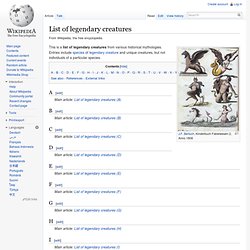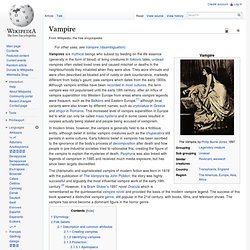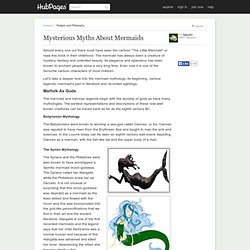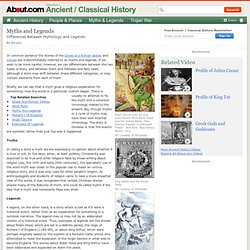

List of legendary creatures. This is a list of legendary creatures from various historical mythologies.

Entries include species of legendary creature and unique creatures, but not individuals of a particular species. A[edit] B[edit] C[edit] D[edit] E[edit] F[edit] G[edit] H[edit] Vampire literature. Vampire. Vampires are mythical beings who subsist by feeding on the life essence (generally in the form of blood) of living creatures In folkloric tales, undead vampires often visited loved ones and caused mischief or deaths in the neighbourhoods they inhabited when they were alive.

They wore shrouds and were often described as bloated and of ruddy or dark countenance, markedly different from today's gaunt, pale vampire which dates from the early 1800s. Although vampiric entities have been recorded in most cultures, the term vampire was not popularised until the early 18th century, after an influx of vampire superstition into Western Europe from areas where vampire legends were frequent, such as the Balkans and Eastern Europe,[1] although local variants were also known by different names, such as vrykolakas in Greece and strigoi in Romania.
Etymology Folk beliefs Description and common attributes Creating vampires The causes of vampiric generation were many and varied in original folklore. Mermaid Mythology. The roots of mermaid mythology are more varied than one would expect.

In modern myth we tend to see mermaids in a singular way - kind and benevolent to humans who keep to their own kind in the deep waters of the ocean. Not all stories go this way, though, and in most cases the most ancient tales of mermaid mythology follow quite a different view. The earliest known mermaid legends come from Syria around 1000 B.C. where the Syrian goddess Atargatis dove into a lake to take the form of a fish, but the powers there would not allow her give up her great beauty, so only her bottom half became a fish and she kept her top half in human form. As myths tend to do, the story changed over time and Atargatis became mixed with Syrian goddess Ashtarte, who is generally considered the counterpart to Greek mythology's Aphrodite.
Later tales in the mythology of mermaids stem from Homer's epic "The Odyssey", where some mythologists believe the Sirens to have been in mermaid form. Mysterious Myths About Mermaids. There have been recorded sightings from fishermen, women, men of reputation within the community of mermaids and mermen.

Some are quite convincing while others are a little vague. Nonetheless they make a good reading. The most recent sighting is of 1947 when an eighty-year-old fisherman reported that he had seen a mermaid ‘in the sea about twenty yards from the shore, sitting combing her hair on a floating herring box used to preserve live lobsters. Unfortunately, as soon as the mermaid looked round, she realized that she had been seen, and plunged into the sea. But no questioning could shake the old fisherman's firm conviction: he was adamant that he had seen a mermaid.' Off the coast of Britain, June 4, 1857, Shipping Gazette, reported Scottish seaman had spotted a creature, ‘in the shape of a woman with dark complexion, and comely face.' Off the Isle of Yell, 1833, six fishermen reported that their fishing line had become entangled with a mermaid.
Myths and Legends - Differences Between Myths and Legends. In common parlance the stories of the Greek and Roman deities and heroes are indiscriminately referred to as myths and legends.

If we wish to be more careful, however, we can differentiate between the two types of story, and between them and folktales and fairy tales, although a story may shift between these different categories, or may contain elements from each of them. Briefly, we can say that a myth gives a religious explanation for something: how the world or a particular custom began. There is usually no attempt to fix the myth into a coherent chronology related to the present day, though myths or a cycle of myths may have their own internal chronology. The story is timeless in that the events are symbolic rather than just the way it happened. Truths In calling a story a myth we are expressing no opinion about whether it is true or not. Legends Folk Tales Let's look at some examples, now, from the ancient world.
~Bingley Introduction to Myth.